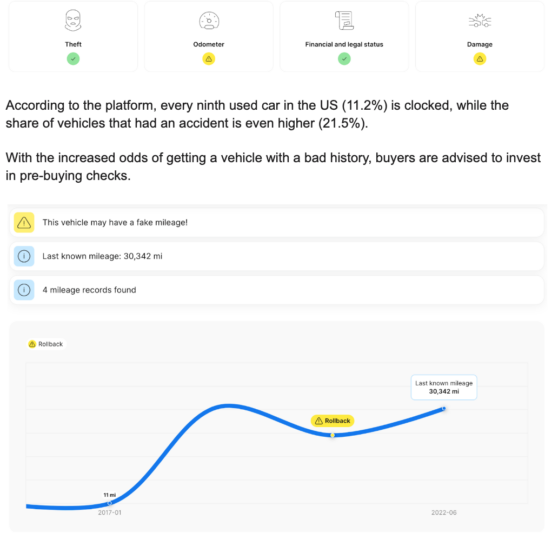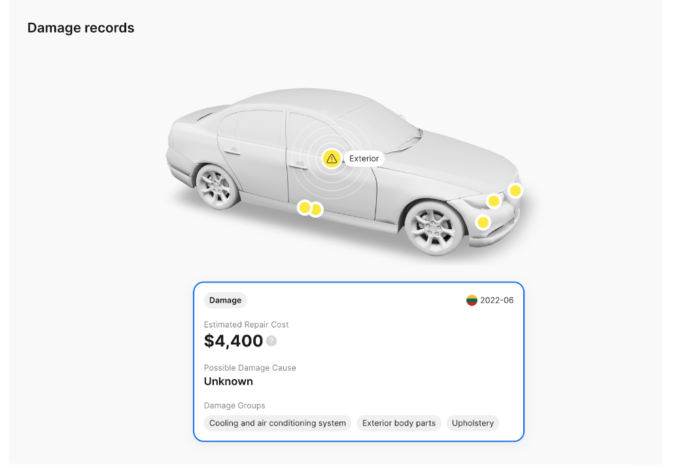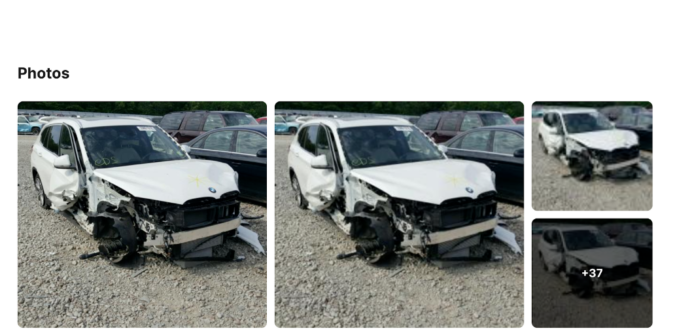Getting your next car is an exciting journey. Unfortunately, the used car market is full of shady deals and information asymmetry between sellers and buyers.
Sometimes buyers underestimate the possibility of getting a car with mileage fraud or severe damage history. carVertical was established to fight such fraud and protect used car buyers by offering available historical records for each particular vehicle.
Fights fraud with over a thousand data sources
carVertical provides car history check services in 27 countries worldwide and collects historical records from over a thousand different data sources.
Every historical car record is linked to a unique vehicle identification number (VIN), which corresponds to people’s fingerprints. All manufactured production cars have VIN numbers, and with this 17-character-long string, buyers can investigate the history of vehicles they’d like to purchase.
Once the car’s VIN number is entered to carVertical, the algorithm searches for VIN-matching information in national and private registries, insurance companies, police databases, auctions and classified websites, and manufacturer and certified workshop networks.
When the data is collected and aggregated, it’s converted to the same format and units and displayed for the user in chronological order. carVertical doesn’t create, edit, or validate any data, meaning each car history report is authentic, up-to-date, and generated specifically for each car buyer.
Exposed history facts provide a bargaining advantage
With the list of car registration and maintenance facts, a mileage graph, and a list of damage records, carVertical users can discover if the car had an accident or an odometer fraud. Sometimes car history reports also include historical pictures that usually speak for themselves.
According to the platform, every ninth used car in the US (11.2%) is clocked, while the share of vehicles that had an accident is even higher (21.5%).
With the increased odds of getting a vehicle with a bad history, buyers are advised to invest in pre-buying checks.
Car sellers consider the information of odometer readings and damage history too sensitive and potentially harmful to their profit margins. Fraudulent sellers usually keep it aside from the buyers, expecting bad history facts to remain completely unexposed.
However, if buyers are aware of the realities of previous ownerships, they can gain a significant bargaining advantage during the negotiations.
Cross-border transactions are the most risky
carVertical also provides detailed general information about each car checked on the platform. It usually includes the year of manufacture, engine, and gearbox characteristics, and sometimes consists of a complete equipment list.
Although similar specifications can often be found on free VIN decoders, the in-house built system is much more flexible and provides accurate details along with a much more valuable history. It’s important to note that this history is collected and stored internationally.
The real strength of carVertical is in cross-border car transactions. According to scientific research, the share of clocked cars in cross-border car trading can reach up to 50%. The risk when buying an imported vehicle is considerably higher than when getting a car from the local market. Since the platform has hundreds of data sources worldwide, it allows users to track cars’ mileage and damage history from different countries.
Cheap way to avoid unpredictable expenses
A single carVertical history check costs $29,99, although the price varies slightly depending on the region or market. It’s advised that each used car should be checked on carVertical for historical records, then tested adequately on the road and inspected thoroughly at a specialist workshop.
These three steps are essential, and if a single step is removed from the car-buying process, the buyer is likely to experience terrible car ownership and unpredictable running costs. According to the carVertical’s research study, the price of vehicles with tampered odometers is inflated by 25% on average.
The difficulties of data extraction
Governments of some countries don’t seem interested in the defense of the public interest and think a car’s VIN number may unveil some personal information. To solve that, each carVertical car history check is fully depersonalized, containing no personal information whatsoever.
Moreover, some data sources are inaccessible because their data is offline and cannot be digitalized easily. There always are some gray areas in the history reports, so users are suggested to assess risks independently before buying a car. For instance, if there was a drop in the odometer history but the readings were up again over a very short period, perhaps there was a mistake in the original data source.
History should be interpreted individually
The same goes for damage valuations. If the history check reveals damage registered in a country with expensive labor, it doesn’t necessarily mean the car cannot be repaired at a much more affordable price. There’s a big difference in workshop labor prices between different states. If the report shows $20,000 of damage costs in California or New York, it may cost less to fix a vehicle in Colorado or Pennsylvania.
Since carVertical doesn’t edit or validate car history data, the platform cannot guarantee that there will be full car ownership history available. For this reason, an automatic refund system was developed. If the report quality is too low, a user is provided with a free history check for the next car. It was a perfect solution to justify unsatisfied expectations for used vehicle buyers.
Shaping new used car buying experience
carVertical has a rapidly growing team that launches hundreds of new data sources annually. It means that the quality of reports increases over time.
The platform also works with used car dealers and similar businesses that care about their reputation and present the history of cars they sell to the buyers on their initiative. The automotive data company believes that the growth of the B2B sector could shape a safer used car buying experience.
With the history reports available in most European countries and the US, carVertical aims to apply its practice in other markets as well.









